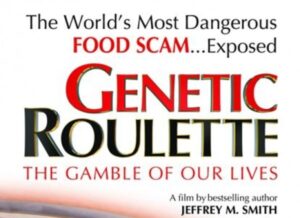New GMO Documentary A Must-Watch

Did you know that the rise in digestive disorders in the U.S. parallels the rise in genetically modified organisms entering our food system? Did you know about the damaging chelating effects in Monsanto’s popular Roundup pesticide? Or that scientists have discovered a “new” organism living in the guts of livestock animals fed GMO grains? If you answered “no” to any of these questions, you may want to watch the new documentary, “Genetic Roulette—The Gamble of Our Lives.”
With polls showing Proposition 37– the bill that would require mandatory labeling on foods containing genetically modified ingredients sold in California—likely to pass in November, there are lots of questions about the risks of GMOs. And it’s no surprise that Jeffrey Smith, one of the leading experts on GMOs, has put together a startling film on the subject.
Written, produced and directed by Smith, “Genetic Roulette—The Gamble of Our Lives” offers a well-rounded overview of GMOs—from how the technology actually works, to the secretive chemical companies driving the biotech industry, to the human health risks associated with consuming GMOs and the companion pesticides like Monsanto’s Roundup.
Seeds of Deception, Smith’s quintessential 2003 book on genetically modified organisms, generated an overwhelming level of concern about the practice—and business—behind the technology changing our food system. And for good reason.
The United States is the only industrialized country in the world that has no mandatory regulations on GMOs. And since 1996, the number of foods containing GMOs has steadily increased. The California Department of Food and Agriculture estimates that nearly 80 percent of processed foods sold in the U.S. today, contain genetically modified organisms, mainly corn, soy, canola and cotton (oil).
In “Genetic Roulette—The Gamble of Our Lives,” Smith dives deeper into the many issues connected with GMOs. The rise in digestive disorders, including leaky gut syndrome and inflammatory bowel disease, is eerily in line with the timeline of GM ingredients making their way into our food. It’s an especially interesting coincidence, as Smith notes, because the Bt toxin (bacillus thuringiensis), which is in much of the GMO corn grown in the U.S., kills insect pests by breaking open their stomachs. Yet no research has been conducted on how this toxin affects the stomachs of humans. But the onslaught of digestive disorders since 1996, suggests Smith, is proof enough.
Another interesting reveal in the film is that ten years before being registered as a pesticide, glyphosate—the chemical marketed as Monsanto’s Roundup—was registered as a broad-spectrum chelator. Chelating agents bind to things like heavy metals—or vital nutrients—and do not let them go. In plants, they weaken its defenses, allowing diseases to easily enter and take over. This could also account for some of the nation’s most serious health problems including autism, infertily and some cancers, speculates Smith and some of the experts interviewed for the film.
One of the most disturbing revelations in the film comes from Purdue professor emeritus, Dr. Don Huber. We covered this story back in 2011 when Huber first announced that he found a new organism—not a virus, not a bacteria, not a prion, not a microplasma, etc –that’s showing up in cattle fed GMOs treated with glyphosate. This organism appears to be connected with an increased risk of infertility and miscarriage in the cows, killing fertilized eggs in as few as 24 hours. Huber sent urgent warnings to USDA Secretary Vilsack about the discovery, but the agency has taken no action in addressing the risk.
The $2.99 donation to watch the film (viewable online) goes to support the Institute for Responsible Technology—Smith’s nonprofit organization spreading awareness about the risks of GMOs. And it’s a worthy spend; the film offers an excellent overview on the complex issue, especially valuable for Californians getting ready to make a decision that could impact the rest of the country’s position on labeling GMOs; and it’s also an important film for anyone who takes their food—and their health—seriously.
Keep in touch with Jill on Twitter @jillettinger

